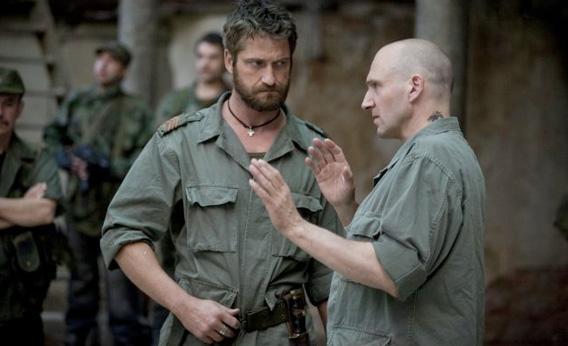It’s always dicey when an actor makes his directorial debut, especially in a film starring himself. Thespian self-directing tends toward the blustery, for reasons that are easy to understand. Actors are used to working with words and gestures, not images and editing, and eliminating extraneous dialogue in the interest of a film’s overall flow might mean cutting the kind of show-stopping speech an actor dreams his whole life of performing. Throw Shakespearean tragedy into the mix, and you have an almost certain recipe for overcooked ham.
That’s why Ralph Fiennes’ Coriolanus, starring Fiennes as the Roman general of the title, comes as such a bracing and welcome surprise. In its best scenes—which is to say those involving Fiennes, Vanessa Redgrave as Coriolanus’ mother, and Brian Cox as his closest advisor, Menenius—Fiennes’ modern adaptation of this seldom-performed political tragedy accomplishes exactly what filmed Shakespeare should, and is so rarely able to. It finds a way to make the play’s rich, dense literary language (just before the climactic battle, one character accuses another of “breaking his oath and resolution like/A twist of rotten silk”) sound as terse and urgent as the dialogue in a tightly plotted action thriller.
In point of fact, Coriolanus was already a tightly plotted action thriller, but screenwriter John Logan has performed a fairly radical word-ectomy on the play, paring it down to short, allusive, often nearly dialogue-free scenes. Fiennes cleverly uses elements of the production design to establish the back story, with snippets of exposition coming at us through a variety of modern media—television chat shows, cable-news crawls, street graffiti. War hero Caius Martius (Fiennes), having returned from a major military victory, is being encouraged by advisors and by his fiercely patriotic mother (Redgrave) and adoring wife (Jessica Chastain) to seek the consulship of Rome. (An early title establishes the setting as “a place calling itself Rome,” but the action unrolls in a nondescript-looking modern-day city—the film was mainly shot in Belgrade, Serbia.)
Unfortunately for his political ambitions, Caius Martius—now called “Coriolanus” after the city he conquered, Corioles—lacks the common touch. The same rigid invulnerability that makes him an unstoppable warrior prevents him from ceding any ground to the starving masses who protest his ascent to power in the streets (a good-looking mob led by the rabble-rouser Tamora, who’s played with arresting directness by the Belgian actress Lubna Azabal). Coriolanus also lacks a taste for the rituals of public speaking and favor-currying required of politicians since time immemorial. Asked to win his fellow Romans over with a speech before the Senate, he begs off with a mixture of modesty, condescension, and arrogance that seals the citizens’ hatred of him. Reviled and banished, the bitter Coriolanus plots his return with the help of his former enemy, Aufidius (Gerard Butler, proving after a run of dull romantic comedy and action parts that when given the chance he can actually act).
The questions Coriolanus poses are so timeless and urgent they could be pullquotes from today’s op-ed page. What makes a great leader, strength or compassion, and why does one quality so often seem to preclude the other? What is the fairest means of determining the popular will? To what degree should we sacrifice our own personal ambition for our family’s well-being, and vice versa? It’s to the movie’s credit that these themes aren’t sententiously signposted; they seem to spring organically from the characters’ words and actions, in no small part because of the contributions of the superb cast.
Fiennes shows a side of himself we don’t often get to see; even his cosmic villain Lord Voldemort in the Harry Potter films had an elegant, melancholy quality about him, but Coriolanus is a graceless man of action, a bellicose brute (and unrepentant snob) whose love for his family serves as the only check on his aggression. Vanessa Redgrave, born into a family of Shakespearean actors, has been steeped in this language literally since babyhood, and it shows—her Volumnia is complex and unforgettable, a septuagenarian Lady Macbeth forced to choose between her ambition for her son and her love for her country. As Coriolanus’ loyal, Penelope-like wife Virgilia, Jessica Chastain gets less to do, but she’s wonderfully fresh, with a knack for speaking 400-year-old iambic pentameter as if she’d improvised it on the spot. And Brian Cox sneakily makes off with scene after scene as the politically savvy Menenius, a would-be campaign manager struggling to teach his bullheaded protégé the art of the schmooze.
Not every choice Fiennes makes in Coriolanus works as well as the casting and production design. The battle scenes, of which there are many, have an appropriately tense, gritty mood, but they’re shot with a shaky hand-held camera and edited together with quick cuts that often leave it unclear whose dagger is being sunk into whom. And scene to scene, the film’s level of energy and violence is ratcheted up so high that the sheer intensity can be exhausting. I know the idea was to move the plot along, and the movie does careen by in just over two hours, but I found myself craving the odd non-confrontational exchange as a respite from the hectic pace.
Since film studios seem ever in need of “properties” from the past to “reboot,” I have a suggestion: what if we let Ralph Fiennes direct one Shakespeare play a year, creating his own onscreen repertory company in the process? It might not sound like box-office gold at first, but after a few installments, maybe there could be an Avengers-style crossover episode, where Coriolanus gets a lesson in humility from King Lear and teams up with Hamlet to fight Richard III. As long as Hollywood has given up on creating original action heroes, why not give Marvel comics a rest and steal from a source that’s truly marvelous?
